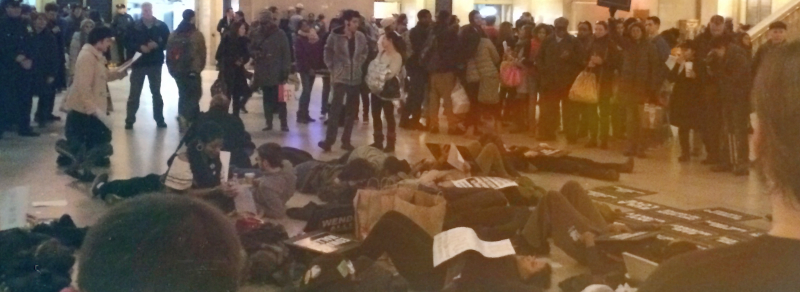“It seems to me that all of that racial tension on campus has kind of blown over. Things are pretty much back to normal again, aren’t they?”
I didn’t really know how to answer that question. At our monthly prayer meeting of campus ministers, one of my colleagues wanted to invite us all to an open forum being hosted by one of his students. This student felt strongly that by giving campus pastors and local church leaders a chance to discuss with students the issue of racism and the idea of racial reconciliation on our campus, we might be able to arrive at a healthy course of action that the university, mired in bureaucracy, has been unable to find.
Last Semester
The University of Kansas was a rather tumultuous place last semester. Like many campuses across the midwest and south, our students, especially our black students, were feeling the sting of injustice from racially-charged events littering the national spotlight, such as the shootings and riots in Fergusson, MO. Tension reached a fever pitch when things turned violent at our neighbor university, The University of Missouri in Columbia. Black students at MU were threatened and even attacked by fellow students and other members of the community, their cars and residences vandalized. The university had to cancel classes in order to keep students safe.
At the same time, students here at KU began to organize protests on campus. Stories of racism and aggression from fellow students, and oversight and inaction on the part of staff and faculty, began to pour out. Our chancellor wisely chose to hold a press conference attended by hundreds of students, faculty members and locals, where she opened the floor up to questions and comments from students. The meeting lasted over three hours.
Fortunately, tensions here at KU never reached the troubling level they did next door in Columbia. The organized protests have ceased, for the time being, and as my fellow minister pointed out, things really do seem to be “back to normal.”
Back to “Normal”
From this position of normalcy, one of our young, black, Christian students suggests getting church leaders together to talk about how we, as “The Church at KU,” can further a process of racial reconciliation on campus. This suggestion, however, is met with bewilderment on the part of ministry leaders. Do we really need to talk about this? It seems like things are “back to normal.”
One of the continuing challenges of unity among ministries is the challenge to create a new normal. It stands to reason that as we move toward deeper unity, some things about our current climate might need to change. But for some of us who are ministry leaders, this can be a scary notion.
It’s tempting to confuse ‘stability’ with ‘health,’ as if things are healthy and normal as long as everything is stable. This is simply not true. In the context of our racial conversation, this means we think that everything is fine as long as black kids aren’t throwing rocks through windows on campus.
How Are We Reacting?
I am growing convinced that one of the most important conversations we can have, when it comes to growing in unity with our fellow ministers, is the conversation about how we react when we see injustice happening to our students. Do we feel the sting with them? Do we bristle at the thought of a student being treated poorly by a fellow student? Do we feel the desire to defend that student? Are we willing to allow that student to react emotionally in a way that they, not we, deem as appropriate? Or are we more concerned that everything remain stable? Are we more concerned that things get back to normal as quickly as possible?
When I see TV news coverage of racial protests turning into riots, am I saddened by the fact that, in my country, people are still not being treated fairly based purely on the color of their skin? Or am I more concerned with the fact that “rioting doesn’t help anything”? Am I just waiting for it to blow over and get back to normal?
Jesus certainly never endorsed violence, for any reason, with any end-goal in mind. He did, however, endorse people indiscriminately. When you love people the way Jesus did, things often get messy before they get better. I pray that The Holy Spirit will continue to help me to react to the injustice enacted upon others with empathy, encouragement and a willingness to get my hands dirty. I pray that my natural tendency to stand a safe distance from conflict and tell others how they should react will be squelched. Lastly, I pray that as my fellow campus ministers and I move further into unity with one another that we will be willing to allow Christ in us to help us move toward a new, healthy “normal,” not just to snap back to the old, stable one.
John Benda is the Director of Campus Christians at The University of Kansas. He has worked in church ministry as a worship leader, high school pastor, associate pastor and teacher. John has also sold used books, cleaned carpets, flipped pancakes and waited tables to make ends meet, and often plays drums in his rock&roll band for absolutely no money at all. He began working in college ministry in 2014. John and his beautiful wife, Lydia, live in Lawrence, Kansas.

